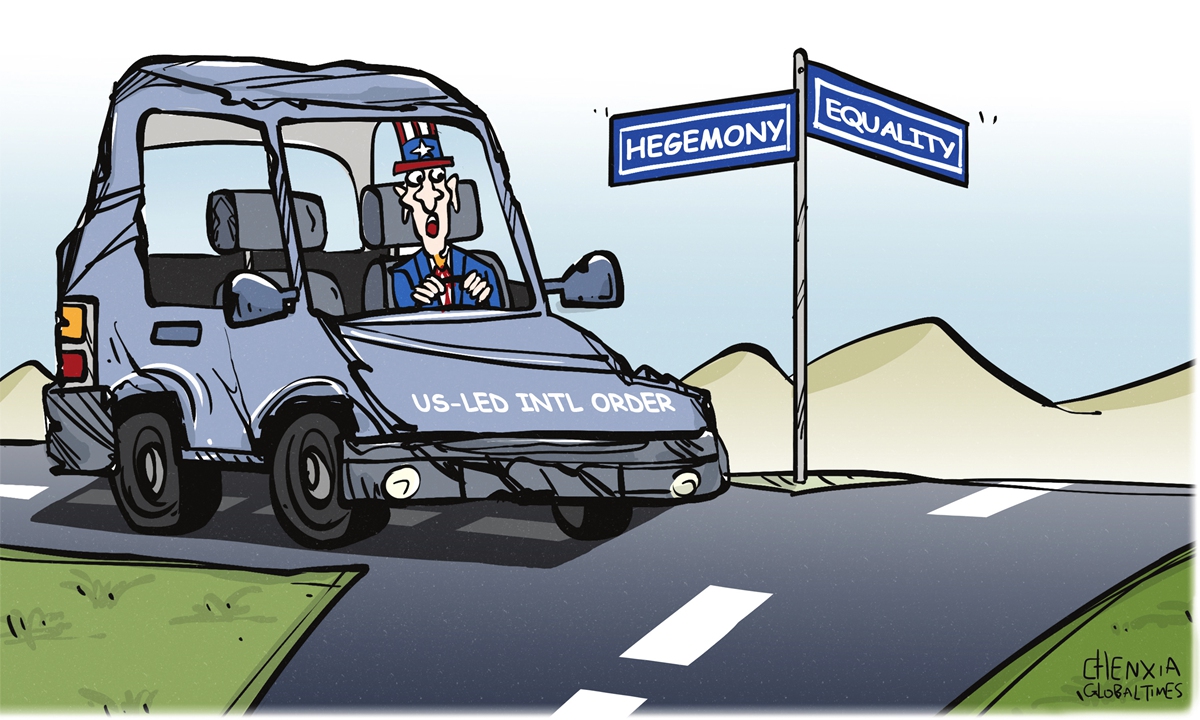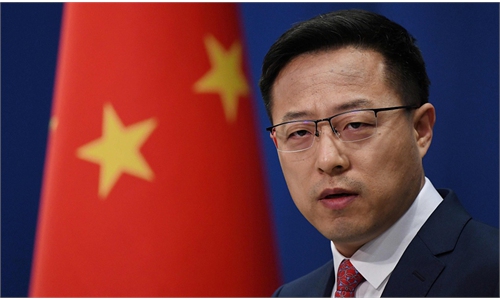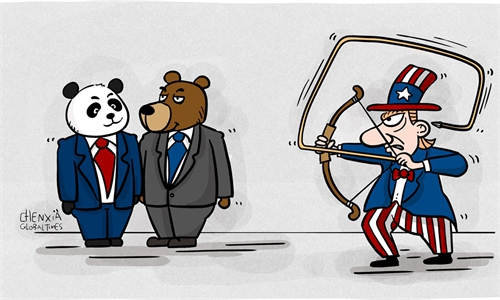
Illustration: Chen Xia/Global Times
During the Munich Security Conference from Friday to Sunday, Russia-Ukraine conflict has been a main priority. But instead of doing anything helpful to resolve the Russia-Ukraine conflict peacefully, many leaders of Western countries made provocative remarks over Russia, making observers believe the forum is not staged for seeking security or peace.
The international community is now at a historic turning point, where global challenges and regional hotspot issues are intertwined. According to the Munich Security Index 2023 released before the conference, the world is becoming a riskier place and risk perceptions of citizens around the world have dramatically increased. To a certain extent, this continues the trend that the liberal international order is facing unprecedented difficulties.
The international order dominated by the US is declining. First, the liberal international order cannot provide convincing rules for the international community. The Western-dominated international order is based on Western rules and ideas, but America First isolationism and protectionism both expose non-neutrality of such a "rules-based order." They ultimately serve the US hegemonic system and Western dominance.
Second, the relative decline of US hegemonic status has led to a decline in the control of its hegemonic system. The US uses NATO, the G7 and other international organizations to engage in bloc politics and camp confrontation. However, after the outbreak of the Russia-Ukraine conflict, more countries around the world have recognized the US' bullying practice of forming small circles and forcing others to take sides.
Third, the US has even brought the logic of zero-sum games into world economic relations. The competition for spheres of influence led by the US and other Western countries may lead to tensions and conflicts, resulting in border closures, the end of globalization, and the interruption of the win-win path of multilateralism, which will cause turbulence and decline in global governance. Therefore, the US-led international order is unable to solve security problems, and is at a critical crossroads or even coming to an end.
Facing the international community's dissatisfaction with the US-led international order, countries are envisioning and rebuilding a new world order with the views of the Global South countries becoming increasingly critical. In the process of the world's multipolarization, countries in the Global South are showing an increasing desire for strategic independence and proactivity, and are unwilling to take sides in the competition among major powers and geopolitical conflicts.
On the issue of the Russia-Ukraine conflict, the Global South countries have generally insisted on promoting dialogue and negotiations. They seek to maximize their own interests amid the competition among major powers, increase their autonomy to the maximum extent possible, and refuse to divide the world into regional spheres of influence.
When Brazilian President Luiz Inacio Lula da Silva visited the US on February 9, he proposed to US President Joe Biden the establishment of a "peace club" that would include China, India, Brazil and other neutral countries to help the Russia-Ukraine conflict be resolved peacefully through negotiations. India will assume the rotating presidency of the G20 in 2023 and it is striving to establish itself as a "spokesperson for developing countries" and to promote the reform of the international order. South Africa hopes to strengthen South-South cooperation, reform the international order, and build a more just, peaceful and equal world. Overall, Global South countries are becoming an important force in international and regional affairs, and their position is becoming increasingly prominent in the reform of the international order.
As the largest developing country, China opposes hegemonism and power politics and promotes the construction of a new type of international relations. First, China responds to the changing international situation and promotes the construction of a balanced, effective and sustainable security architecture, so as to tackle peace deficit and respond to international security challenges.
Second, China has adhered to an independent and peaceful diplomatic policy, insisted on a common, comprehensive, cooperative and sustainable security concept, and will always pursue the path of peaceful development. China's stance of non-interference in other countries' internal affairs is widely viewed positively by elites and ordinary people in countries of the Global South.
Third, the future international order needs a truly multilateralist concept and path to provide a set of governance norms and institutional arrangements for the highly interdependent world. Security is a global public good highly relied upon by all countries in the world. China actively participates in the formulation of international security rules, strengthens international security cooperation, actively participates in UN peacekeeping operations, and plays a constructive role in maintaining world peace and regional stability.
The author is a research fellow with the Institute of European Studies, Chinese Academy of Social Sciences. opinion@globaltimes.com.cn



